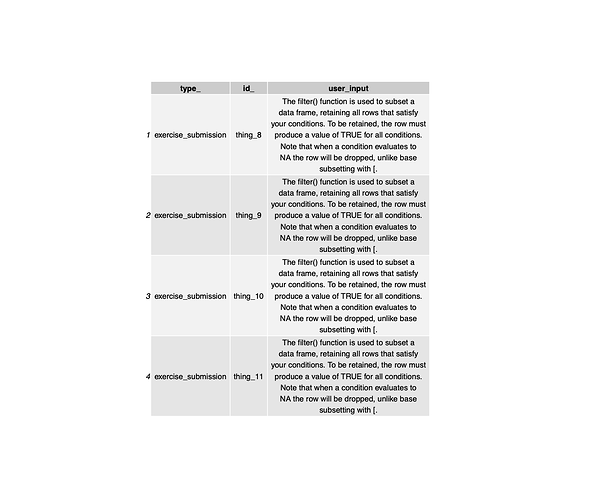Hello,
I'm currently working on printing a tibble onto a PDF, but I've ran into a formatting problem:
The tibble has 2 character columns, and one of them can sometimes be very long like the length of a paragraph. The result almost always takes more than one page of pdf, so I wrote a janky piece of code that calculates page number based on the number of newlines. I've provided the code used currently to create the PDF. Is there a way to wrap the text so that it formats nicely on the PDF?
The following is one page of my current result:
full pdf:
somethings.pdf (36.9 KB)
The code I use right now to create this is here:
# Use to create objects to use in example
new_objs <- data.frame(type = character(),
id = character(),
main_text = character(),
stringsAsFactors = FALSE)
for (i in seq_along(1:100)){
big_txt = "The filter() function is used to subset a data frame, retaining all rows that satisfy your conditions. To be retained, the row must produce a value of TRUE for all conditions. Note that when a condition evaluates to NA the row will be dropped, unlike base subsetting with [."
type_ = "exercise_submission"
id_ = paste0("thing_", i)
new_objs <- rbind(new_objs, c(type = type_, id = id_, main_text = big_txt))
}
# Actual Function
createPDF <- function(objs, fname){
pdf_df <- data.frame(
type_ = character(),
id_ = character(),
user_input = character(),
page_num = integer(),
stringsAsFactors=FALSE
)
# Threshold of number of text rows in one page
page_threshold <- 20
curr_rows <- 0
curr_page <- 0
for(i in 1:nrow(objs)) {
obj <- objs[i,]
# If we are at or past the threshold, we have enough data for one page
# so we append the current df to df_list and reset the df
obj_type <- obj$type[[1]]
obj_answer <- ""
if (obj_type == "exercise_submission"){
obj_answer <- stringr::str_wrap(trimws(obj$main_text[[1]]), 45)
} else{
obj_answer <- stringr::str_wrap(trimws(obj$main_text[[1]]), 45)
}
# Increment curr_rows by number of newlines
curr_rows <- curr_rows + stringr::str_count(obj_answer, "\n")
if (curr_rows >= page_threshold){
curr_page <- curr_page + 1
curr_rows <- 0
}
obj_id <- obj$id[[1]]
pdf_df <- rbind(pdf_df, c(type_ = obj_type, id_ = obj_id, user_input = obj_answer, page_num = curr_page))
}
colnames(pdf_df) <- c("type_", "id_", "user_input", "page_num")
pdf_df$page_num <- factor(pdf_df$page_num)
# Create PDF
grDevices::pdf(fname, height = 11, width = 20)
# Write dataframe to corresponding page on PDF
for (num in sort(parse_integer(levels(pdf_df$page_num)))){
print(num)
grid::grid.newpage()
gridExtra::grid.table(dplyr::select(dplyr::filter(pdf_df, pdf_df$page_num == toString(num)), -page_num))
}
# Close PDF
grDevices::dev.off()
}
# Calling the function to create the PDF
createPDF(new_objs, "/path/to/location.pdf")
Thank you in advance for your help!
